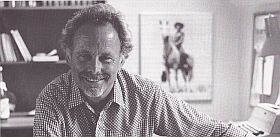”Niels Jensen behandler på sin umistelige lyriske malerbaggrund indforstået Palle Kjærulff-Schmidts ‘Der var engang en krig’ og når efter et langt tilløb om den tids stemning frem til Claus Loofs fotografi. Som, ja altså, så forunderligt præcist rammer den stemning. ’Så smukt som grålys kun kunne være det i – nej ikke i fyrrerne. Men i tresserne.’ Det var jo Coutards lys…” (Fotografi: Niels Jensen på sit kontor på SFC omkring 1985 fotograferet af Freddy Tornberg)
Forleden dag udkom i Ulrich Breunings redaktion på filmskolens hjemmeside Niels Jensens efterladte forelæsningsmanuskripter. Det synes vi her på Filmkommentaren er en dejlig nyhed. Derfor har vi her samlet hvad vi har skrevet om Niels Jensen og hans arbejde.
NEKROLOG 2010
af Tue Steen Müller
Så sidder man her på et hotelværelse i Tbilisi i Georgien med tårer I øjnene. En halv time efter at en sms tikkede ind med meddelelsen om Niels Jensens død. Jeg så ham sidst i Filmhuset under festivalen cph:dox, han så svag ud og fortalte mig, at hans hjerte var slidt og at han tit tabte pusten. Han var på vej til biblioteket med filmbøger. Niels var ikke gået på pension, han havde stadig timer på Filmskolen. Men han ærgrede sig over, at han ikke længere kunne køre på cykel ud til Holmen!
Det er mig fuldstændigt umuligt at skrive en nøgtern nekrolog om en mand, der i årtier var Danmarks bedste filmformidler og som lærte mig om filmens vidunderlige verden. Det må blive personligt, men jeg ved at mange kendte Niels, som jeg gjorde det – som det altid inspirerende menneske, som var glad for at give fra sig. Uegennyttig. Et ordentligt og fint menneske, altid til at stole på. Og aldrig til fals – da Mimi Stilling Jacobsen i sin tid som kulturminister skulle godkende en indstilling om en programredaktion ved Statens Filmcentral (SFC), og mente at 2/3 af trioen Erik Thygesen, Bente Hansen og Niels Jensen var for rød, blev der ringet fra ministeriet til Niels (der ikke var “rød”) med besked om at han kunne blive godkendt, hvis han ville… svaret fra ham var, at det var alle tre eller ingen. Loven blev derpå lavet om, så ministeren ikke længere skulle fungere som “gummistempel”.
Jeg ved, at aviserne vil skrive om hans viden om og kærlighed til John Ford og westerngenren. Og om hans store interesse for og viden om Ingmar Bergman. Det har aldrig betydet noget for mig, og det var ikke det, som optog ham mest. Hans hjerte var knyttet til kort- og dokumentarfilmen, og han fik lejlighed til at præge den danske i mange år som filmkonsulent ved Statens Filmcentral (SFC) og før da som konsulent ved Kortfilmrådet. I bedste folkeoplysnings-forstand og i den ånd, som lå bag oprettelsen af SFC, var Niels altid den stærke fortaler for at film skal bruges til at blive klogere af. Jeg gav ham en stak udenlandske dokumentarfilm i begyndelsen af dette år, han så dem, og vi mødtes på Husmanns Vinstue, og Niels analyserede med få ord filmene med præcision og stor entusiasme. Og tit med en parallel til andre kunstarter, specielt malerkunsten men også litteraturen, den korte, novellen, som han har skrevet en bog om.
Åh, der ryger så mange minder igennem mit hovede – om redaktionsmøder i SFC, rejser sammen til Berlin, for meget rødvin i forbindelse med Cinéma du Réel i Paris, meget velkomne belæringer om, hvad det vil sige at være lærer, de slidte udgaver af hans fremragende bog “Filmkunst”. Der var højt til loftet og respekt for andre. Mens jeg skriver dette løber en mail ind fra Jørgen Vestergaard, en af mange danske filmfolk, som Niels satte højt og hjalp. Vestergaard skriver: Jeg har kendt Niels siden jeg i en alder af nitten var elev på Krogerup, og jeg føler det som et stort tab… Ja, mon ikke! (TSM, blogindlæg 10-12-2010)
CINÉMA VÉRITÉ
af Allan Berg Nielsen
Jørgen Vestergaard var ung og begynder dengang i 1961, da han var assistent på Carlsens film fra Limfjorden, men han var som den journalist, han også ville være, herefter erobret af den poetiske måde at rapportere på. På film. Carlsens regler var dengang med den produktion: 35 mm. Sort/hvid. Ingen musik. Film som ikke er turistfilm, som Carlsen skriver i ledsageteksten til dvd’en, som kom ud i år. Bortset fra det sidste modificerede de begge senere denne strenghed.
Et kapitel i dansk filmhistorie begynder her. Vestergaard er et par år senere med sin første rigtige film ”Sommerheste” i gang med en livslang værkrække, og Carlsen er allerede begyndt på sin berømte trilogi (som også findes på denne dvd), der introducerer cinéma vérité i dansk film. Niels Jensen skriver om det i sin bog, ”Filmkunst” (1969) og citerer Henning Carlsens begejstring for Jean Rouchs og Edgar Morins metode: ”Dette studie i et menneskeansigt… er drama mere end nogen forfatter, skuespiller eller instruktør kan skabe – det er det, der hedder ’cinéma-vérité’ – sand film!” Niels Jensen vidste godt, at Carlsen ikke kendte Rouchs og Morins film i 1960-61, ”… men hans ord bringes for at vise hvor meget instruktøren (Carlsen) længtes efter en dokumentarfilm, der beskæftigede sig med mennesker.”
Og det er også ved gensynet disse mange år senere, man gribes af billederne af menneskene fra dengang. Fastholdt af dem lige fra den første lange scene med de to, som i kølig morgendis vader ud til jollen, stiger om bord og i en stilfærdig lyd fra det, som sker og er der og ikke andet, ror ud og ud, til de forsvinder i dis, lige før de forsvinder ud af billedrammen. Carlsens klip, som behjertet følsomt har ladet os vente længe, længe for at se, se, lader os i tvivl om det, men vi ved jo, at de skal røgte garn, at kameraet senere i fortællingen efter reglen, vi har i nervesystemet, vil samle dem op ude ved pælene. Sådan er den, billedfortællingen, som den tids nye æstetik og Theodor Christensen forlangte det, som Carlsen ville det. Denne film og så ”Familiebilleder”, som han lavede samtidigt, står blandt de mange dokumentarfilm, han har overkommet, hans hjerte nærmest, skriver han i ”Mit livs fortrængninger” (1998). De siger ikke noget, de to fjordfiskere, de ved, hvad der skal gøres og koncentrerer sig om det. Sådan er det også med deres modsætning, havnearbejderformanden inde i Aalborg, som med udsøgt musikalitet i sine hænder dirigerer cementsække igennem en dæksluge, og netop under denne optagelse går det en smule forkert og.. ja, op igen, om igen. Bemærkningen falder, som var det filminstruktørens, en af de få replikker i den tavse film. Jo, tavs er den. Erik Aalbæk Jensens og Nicolai Lichtenbergs speak er udenfor, af en anden verden, højskolens, belæringens, distancens. I dag kunne den godt undværes, den ved ikke, hvad den taler om, filmbillederne ved det. Den er et udenværk, som er til at komme omkring ind til den rene film. (ABN, blogindlæg 13-12-2010)
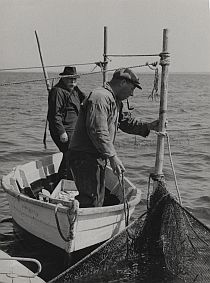
MODERNE DOKUMENTARISME
af Allan Berg Nielsen
Niels Jensen skrev i ”Filmkunst” (1969) videre om Henning Carlsen, at han med trilogien ”De gamle”, ”Familiebilleder” og ”Ung” (1960-65) var blevet “den førende danske repræsentant for moderne dokumentarisme.” Det var skarpt set og modigt vurderet blot fire år senere, men det var også kyndigt, har det herefter vist sig. Afsnittet i det store filmæstetiske essay fortsætter om Carlsen: “Da De gamle blev til, stak dansk kortfilm endnu i al væsentlighed i tredivernes og fyrrernes tradition. Man fremlagde og redegjorde, spurgte ikke thi man vidste det hele og opsøgte ikke mennesker på hvis ansigter livet havde skrevet. Nu kom det. Lykke og sorg, tryghed og modgang, fællesskab og ensomhed ses i billederne af ‘De gamle’ og høres i stemmerne.”
Henning Kristiansens teleoptagelse af de to på bænken i parken er fra Familiebilleder. Til netop denne scene, som er et indklip, særdeles medtolkende, som det er placeret i filmen, knytter Henning Carlsen i ”Mit livs fortrængninger” (1998, 134f) en afmonterende anekdote, som dokumenterer, at virkeligheden i historien bliver til en virkelighed, som overtrumfer den virkelige. Dokumentarfilm er konstruktion. Konstruktion af sand virkelighed. Det er måske også Niels Jensens konklusion på en tilsvarende læsning af en Carlsen-tekst, Jensen skriver i ”Filmkunst”: “Henning Carlsen, der i sin tid begejstredes over cinéma vérités sandhed har nu givet dette en drejning og er endt med (i et interview i Kosmorama nr. 81) at prise det subjektive og anfægte selve forestillingen om det dokumentariske. Findes det overhovedet? Findes der andet end instruktørens film?” Niels Jensen så det med det samme dengang i 1969, men der er stadigvæk politiske sager om det dokumentariske billedes sandhedsværdi, sådan er det i den virkelighed. Pointen i dette er imidlertid, at de to på bænken godkendte brugen af deres samvær, skønt det i deres virkelighed, da de uden at vide det blev filmet, havde et helt andet indhold end klipningen tillagde det. De var nemlig biografgængere og kendte også den virkelighed som virkelighed.
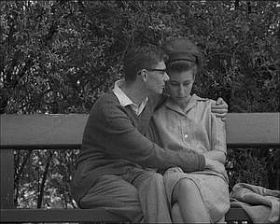
KORT OM KORTE HISTORIER (2007)
af Tue Steen Müller
For tre år siden blev jeg af Film, DFI’s blad, bedt om at vælge mig en filmisk julegave og begrunde valget. Jeg valgte en bog af netop afdøde Niels Jensen, som jeg siden da har læst med stor fornøjelse. Her følger min begrundelse fra 2007 – og hvorfor ikke lade den være en julegave i år 2010:
Hvorfor elsker jeg korte film? Jon Bang Carlsen mente engang, at jeg måtte have problemer med vandladningen og ikke kunne sidde stille til en “Abendfüllender Dokumentarfilm”! Jeg selv mener jo, at det er i denne genre, der overskrides grænser og kan findes antydning og præcision i udtrykket.
Den egentlige forklaring er den, at Danmarks bedste filmformidler klogt og pædagogisk har vist mig vejen fra den dag, jeg lærte ham at kende sådan cirka for 25 år siden. Som højskolelærer, som programredaktør ved Statens Filmcentral og som lærer ved Filmskolen har han brændt for filmen som kunstart og øst ud af sin store kærlighed og viden. Navnet er Niels Jensen, som for længst kunne have lagt fødderne op på fodskamlen efter en smuk og uselvisk tjeneste til gavn for dansk filmkultur.
Det gjorde han ikke. I stedet har han nu udgivet en ny bog, hvor han introducerer os til novellen, novellefilmen og noveller omsat til spillefilm. Sikkert med en masse henvisninger til billedkunsten. Jeg glæder mit til at læse den. Som jeg gjorde i sin tid, da “Filmkunst” åbnede mine øjne for at film skal ses i sammenhæng med andre kunstarter og kulturelle strømninger. Derfor står den bog øverst på min ønskeseddel!
”Kort om korte historier i litteratur og på film” Af Niels Jensen, 2007, 439 sider. Udgivet af Den Danske Filmskole. (TSM, bloginlæg 14-12-2010)
THE VERY DANISH NAME
by Tue Steen Müller
To our non-Danish readers who might have noticed that several recent Danish language articles circle around the name, the very Danish name, Niels Jensen.
The reason is that Jensen died a week ago, 81 year old after a long and important contribution to Danish film culture. He taught film – and many other topics – at the Danish folk high school Krogerup, he was a teacher at the Danish Film School, he served years as film consultant at the National Film Board of Denmark (now Danish Film Institute), and was a member of the board of directors at the same institution, and many other committees.
And he was an excellent writer which we film buff Danes have profited from. He wrote the best Danish book on film, ”Filmkunst”, and made reviews and presented films on television. A constant source of inspiration and semper ardens and interested in other people. Niels Jensen, I am sure, also has fans outside Denmark, he made several tours to American universities. (TSM, blogindlæg 15-12-2010)
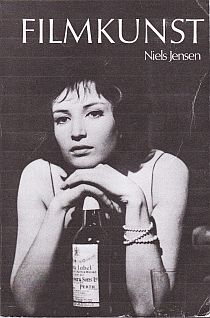
ANHALTER BAHNHOF
af Allan Berg Nielsen
Fra Tue Steen Müllers private videotek har jeg lånt en film om arkivmaterialets alvor, en dokumentarisk rekonstruktion formet som filmisk elegi. En gammel mand sad for længe siden i en mørk biograf i Berlin og så ”Berlin, Sinfonie einer Grossstadt”. Skribenten, som fortæller historien, sad i nærheden, ja, det var Niels Jensen, og Jensen hørte ham mumle for sig selv: ”Anhalter Bahnhof, Anhalter Bahnhof…” op mod de stumme sort/hvide scener. Det kom fra en dyb smerte, tabet var stort. Udenfor var nu “kun brudstykket af en portal, murbrokker og græs tilbage.”
Jeg så for lidt siden omsider Yael Hersonskis berømte, Sundance-vindende film ”A Film Unfinished” (2008) og kom til at tænke på det citat, denne korte replik, som blev ved med at gentage sig i mig, som en melodilinje, der ikke vil forsvinde. Jeg så nu disse nutidige mennesker, som var børn dengang, sidde i en moderne biograf og 65 år senere se optagelser fra Warszawas jødiske ghetto, hviske og udbryde og direkte sige sådanne ting til boomstangens mikrofon: ”Måske kommer min mor om lidt gående der på gaden…” Det er dyb smerte, tabet er værre end forfærdende, moderen blev vel kort tid efter dræbt i Treblinka som tusinde flere. Oplevelsen i biografsalen er uafrystelig, at se ansigtet som ser. Som Anna Karinas ansigt, når hun i en mørk biograf i Paris ser Jeanne d’Arcs lidelse og død. Lidelse og død.
Jeg ved godt, at Yael Hersonskis hovedanliggende er en detektivisk kortlægning af den tyske besættelsesmagts manipulering af dokumentarfilmen. Filmen var i sin begyndelse i 1942 tænkt som propaganda. De indespærrede i ghettoen levede iscenesat en times tid som forkælede bedsteborgere. Som nu herren, som sidder og læser ved chatollet. Men så blev der i arkivet fundet en glemt filmrulle med fraklippet. Der blev fundet to dagbøger, som fortalte om optagelserne, om de tyske dokumentarfolks arrangeren alting. Den læsende herre er altså tvunget til at sidde der i ro, og det er, hvad han har tilbage, disse tre møbler, bag kameraet er stuen fyldt med resten af hans familie. I soveværelset bor en anden familie, i de andre værelser andre, én familie i hvert rum. Fraklippene på den nyfundne rulle viste kamerafolk gå ind i hinandens scener, sådant måtte jo ud. Og det måtte den åbenlyse nød, sult, brutalitet, vold og død også. Nu er det hele omhyggeligt på plads i Hersonskis uafviselige og umistelige værk. Omsider sidder jeg foran arkivmaterialets alvor: Warszawa, Warszawa… Filmen er Yael Hersonskis. (ABN, blogindlæg 13-03-2011)
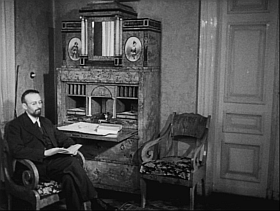
NOTER TIL FILMHISTORISKE NEDSLAG (2014)
af Tue Steen Müller
Det var en herlig tirsdag eftermiddag på Den danske Filmskole. Niels Jensen var tilbage i rollen som den inspirerende, vidende og altid veloplagte filmpædagog og -historiker. Her er historien:
”Indtil sin død arbejdede Niels Jensen på et manuskript, som man med god ret kunne kalde filmhistorien ifølge Niels Jensen. Eller måske snarere et livstestamente, der samler et langt livs viden. Nu kan de første fire bøger downloades her på hjemmesiden ”.
Ja, det er rigtigt, gratis kan alle læse, på nettet, hvad Jensen har skrevet om ”filmens begyndelse”, ”filmens sprog og filmens stil”, ”russiske film fra 1920’erne” og ”tyske film fra 1920’erne” – 75-80 sider pr. bog, velillustreret, enkelt og smukt sat op.
Bogreceptionen på filmskolen for familie, venner og kolleger blev flot indledt af skolens leder af efteruddannelsen, Tina Wagner Sørensen og Ulrich Breuning, som afløste Jensen som lærer på skolen og som veloplagt fortalte om Jensens evne til altid at sætte filmhistorien i forbindelse med billedkunst, filosofi, historie, politik… Anekdoterne flød fra Breuning, som af Tina Sørensen fik en velfortjent tak for con amore at have gjort manuskripterne tilgængelige.
… og så tonede Niels Jensen frem på lærredet. Peter Klitgaard havde filmet en af Jensens forelæsninger, om neorealisterne, og Jørgen Kastrup, klipper, havde fundet frem til klip fra genren: Viscontis ”Ossessione”, Rossellnis ”Païsá”, de Sicas ”Cykeltyven” og ”Umberto D” osv. Jamen, sådan var det jo, når Niels Jensen talte om film, uden manuskript og altid i kontakt med tilhørerne! Filmen er til internt brug, da ingen rettigheder (pt) er clearet. Foto: Freddy Tornberg for Statens Filmcentral.
To our non-Danish readers – the text above refers to the actual publishing of filmhistorical texts by Niels Jensen – who died December 2010, 81 year old, after a long and important contribution to Danish film culture. He taught film – and many other topics – at the Danish folk high school Krogerup, he was a teacher at the Danish Film School, he served years as film consultant at the National Film Board of Denmark (now Danish Film Institute), and was a member of the board of directors at the same institution, and many other committees. (TSM, blogindlæg 01-05-2014)







